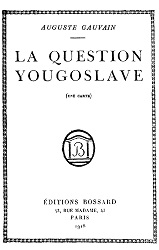LA QUESTION YOUGOSLAVE
The Yugoslave Question
Author(s): Auguste Gauvain
Subject(s): History, Recent History (1900 till today), Pre-WW I & WW I (1900 -1919), Between Berlin Congress and WW I
Published by: CEEOL Digital Reproductions / Collections
Keywords: Balkans; Worldwar I; Serbia and Entente powers;
Summary/Abstract: The lack of interest is one of the causes of the most serious mistakes made by the Triple Entente in recent years. Its leading men, civilians and soldiers alike, realized neither the material and moral value of the forces moving in the eastern Adriatic, nor how they should be used. They took into consideration neither the warnings, nor the designs, nor the protests of the representatives of the peoples commonly known as the Balkan, although many of them had nothing in common with the Balkans. Even in a democracy, our ministers preserved the old customs of the great courts; they preferably discussed with the ambassadors of the great consecrated powers and, while showing the other heads of mission outward respect or cordiality, attached little importance to their conversation. As a result, they lost valuable opportunities to learn about things they had not been taught in their youth and which they subsequently neglected to study. They relied more on second- or third-hand intelligence, transmitted by agents who wished to please them by entering into their supposed views, than direct information from qualified foreigners with a deep knowledge of the country and the affairs they came to discuss. They were warned against men whom they held to be interested in speaking in a certain sense, though that interest might match our own. Unfortunately, the concordances were poorly discerned, even in Russia. Despite their status as Slavs, Russian ministers did not understand Yugoslav affairs any better than their Western colleagues. We will be amazed later, when it is revealed what ignorance some of the most eminent of them showed on this subject. The consequences of such errors are too terrible for us not to try to enlighten the public on a question which, by the inevitable chain of circumstances, is now at the forefront of European politics.
Series: CEEOL COLLECTION related to YUGOSLAVIA
- Page Count: 108
- Publication Year: 1918
- Language: French
- eBook-PDF
- Table of Content
- Introduction

